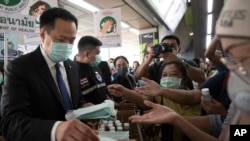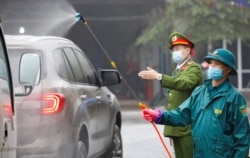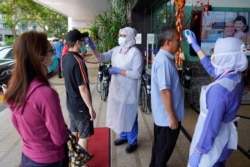A bevy of new laws across Southeast Asia barring dissemination of fake news are being put to the test by the spreading coronavirus, with bloggers in at least two countries facing possible prison time for postings as short as one sentence.
Authorities say they are merely trying to prevent public panic about the coronavirus, but critics say that arresting people for social media posts is excessive and stifles free speech.
Many nations in Southeast Asia have passed laws against fake news in recent years. That, combined with the growing trend of single-party rule in the region, has increased the odds that authorities would crack down on questionable internet content.
At least two people in Thailand and two in Indonesia each face up to five years in prison for allegedly spreading false information about the coronavirus. Wan Noor Hayati Wan Alias, a journalist in Malaysia, faces up to six years for her posts about the virus on social media. Vietnam has threatened large fines for related false information, while Singapore has ordered websites to correct such information.“
Keep this up, and people will be too scared to share their opinion about anything,” Teddy Baguilat, a former congressman in the Philippines, said.
People like Baguilat are concerned about the risk of scaring off commenters, in part, because of the deadly case of Li Wenliang in China, where the media operate under tight Communist Party control.
Li was among the first Chinese doctors to warn about the coronavirus, on December 30. However, a few days later, authorities forced him to retract his warning. Not only has Li himself now died from the virus, but critics see his case as a cautionary tale of authorities cracking down on information they claim is false, possibly allowing the virus to spread even further.
If authorities go too far, they could threaten free speech, including press freedom, according to the Committee to Protect Journalists.
“The wrongheaded and misplaced charges against Malaysian journalist Wan Noor Hayati Wan Alias should be dropped immediately,” Shawn Crispin, the senior Southeast Asia representative at CPJ, said.
“Reporters everywhere must be allowed to freely report and comment on the coronavirus, and to keep the public well-informed on the evolving health emergency,” he added.
In the internet age many nations are struggling to deal with false information, which people fear has affected political elections from the United States to Brazil. The particular issue in Southeast Asia is that laws against fake news are more common, and nations in the region have some of the highest rates of internet growth in the world, meaning more and more Southeast Asians are new to the internet, with all its potential for misinformation.
Singapore enacted the Protection from Online Falsehoods and Manipulation Act last year. Also last year, Vietnam’s cybersecurity law took effect, letting authorities demand that social media sites remove false information.
Malaysia reversed its plans to enact a similar law last year, but is still arresting citizens for their online posts about the coronavirus. Indonesia’s Information and Electronic Transactions Act is becoming its de facto anti-fake news law, too, according to Ross Tapsell, senior lecturer and researcher at the Australian National University’s College of Asia and the Pacific.
As these are fairly recent laws, the coronavirus is the first instance of regional news that has really affected all of Southeast Asia and forced its governments to decide how to apply their information laws to this rapidly changing epidemic. Critics fear, however, that the governments are using the messy news of the virus as an excuse to suppress unfavorable content. They say that, regardless of whether an online post is true or false, it is an overreach for the government to use such posts as a reason to lock up citizens.“
While it is important for authorities to prevent the spread of disinformation, and ensure accurate information about the coronavirus, across the region we are seeing a worrying trend of ambiguously worded laws being used to prosecute citizens,” said Baguilat, who is also a board member of the Association of Southeast Asian Nations Parliamentarians for Human Rights group.







